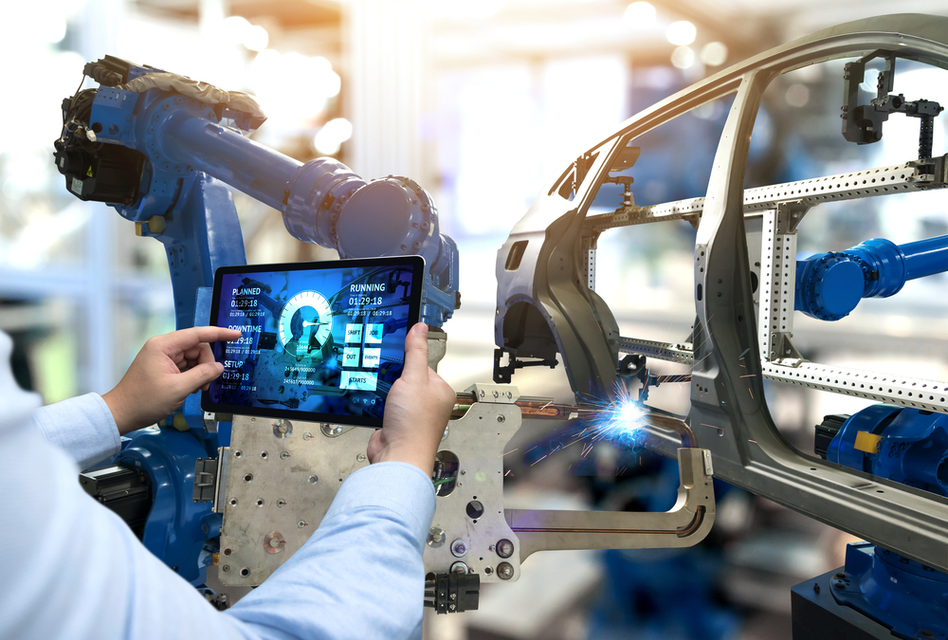Blockchain is being used by various industries to revolutionize and optimize systems and processes. The automotive industry is just one of the many that can be disrupted by blockchain. Automotive blockchain systems can enhance various aspects of manufacturers’ and dealers’ workflows, whether it be through supply chain management, logistics, payroll, or remanufacturing. Blockchain can be just as revolutionary to the whole automotive industry as the Ford assembly line was in its time.
Using Blockchain in Automotive Supply Chain Management
Supply chain management is one of the most challenging domains in the automotive industry. This is mainly because parts are delivered from all over the world. Spark plugs and other systems associated with transmission are often provided by Asian regions, whereas drive train systems often come from Europe. In this light, the question of their proper traceability becomes especially urgent. So how does blockchain tackles this challenge?
- By linking each point in the supply chain to a blockchain network, it is easy to track where parts come from, when they will be ready for shipment, and when they will arrive.
- Quality, quantity, part numbers, assembly, and all other aspects of parts can be identified and updated through the blockchain.
Blockchain can provide a more transparent system for supply chain management. It is currently being developed in the shipping industry to quickly move objects around the world. Smart contracts are utilized to automate various tasks that rely on human intervention. In the same way, smart contracts can automate and speed up different aspects of vehicle life cycles in automotive transactions.
Using Blockchain for Transferring Automotive Titles
No one enjoys going to the Department of Motor Vehicles (DMV). Wait times and paperwork stem from the lack of experience. This is not because DMV employees are not qualified to perform their jobs; rather, the system they work with is a way too outdated.
Transferring titles of ownership is just one of the many ways in which blockchain can transform the automotive industry. At the moment, car titles are primarily paper-based and require either a physical visit to the DMV or mailing in an application.
With blockchain, it is possible to provide digital equivalents to current paper-based car titles. With these systems, it would be much easier to purchase or transfer the ownership of your vehicle.
Through smart contracts and the Internet of Things (IoT), it will eventually become possible to buy a car without talking to a salesperson. In practice, it would work like this: a person would be able to choose the model of the car they want to buy online (maybe a Mazda or a Honda). At that point, they would contact the seller. With blockchain, a smart contract could be drawn up between the two parties, outlining the terms and the time of payment.
The vehicle the buyer wants to purchase would be located at a specific spot — either at a private party or a dealership. The locks on the vehicle could be automated to open once the payment for it has been made. Thus, the title would be digitalized, and the transfer of ownership would be complete.
Again, all this is accomplished without having to go to the DMV or interacting with another person, which would also cut registration costs on the buyer’s end.
Increasing Remanufacturing with Blockchain in the Automotive Industry
Remanufacturing is a major part of the automotive industry. Look back at all the vehicles you owned in your life, how many of those were brand-new?
One of the major global database companies, Statista, has published their report of the U.S. car sales market for the period from 1990 to 2017. According to the report, used car sales were almost always 30% higher than the sales of the new ones. For example, in 2017 there was 17.1% of new car sales and 42.7% of the used ones.
Remanufacturing is an important aspect at all points of the automotive system, both for a consumer and manufacturer. It can provide cheaper options to consumers through recycling of old parts — no one is going to spend more on a car that has already been driven. However, because these vehicles rely on repurposed parts, those parts are often difficult, if not impossible, to find.
For this purpose, a blockchain automotive system could be developed for remanufacturers that would work as a sort of a forum for tracking down used parts. Entities could request parts by updating the blockchain to include the part they need, how many they need, and the quality they request. Sellers of parts could upload their entire inventory into the blockchain, thereby providing a system in which all the available parts would be immediately visible to every blockchain member.
Remanufacturing is often considered to be a win-win-win situation: a win for consumers as they are provided with cheaper options, a win for producers as they are still getting decent profits, and a win for the environment as remanufacturing greatly reduces CO2 emissions. All of this was made possible with blockchain.
Blockchain Can Improve Automotive Mass Recalls
Almost 400 million vehicles have been recalled within the U.S. since 1966. A vehicle recall is often a necessary process, which can end up costing automotive manufacturers billions of dollars.
Recalls often occur when a vehicle has been released prematurely, and there may be safety concerns related to it. In order to prevent massive amounts of injuries and potential lawsuits coming their way, auto manufacturers perform recalls.
However, it can often be hard to determine which vehicles were especially affected by problems. Blockchain works as an immutable ledger, recording information that cannot be altered unless a majority consensus is reached among all the validators in the chain.
Theoretically, if proper supply chain management procedures are enabled with blockchain, a flaw in a series of vehicles can be identified immediately. From that point forward, those vehicles can be recalled, thereby saving automotive manufacturers significant amounts of money in the process.
Blockchain is already being successfully used in the food supply chain. The E. coli bacteria has become a significant problem, and because of this, a tracking system that determines the affected greens has become necessary. IBM and Walmart have teamed up and implemented it.
These same systems can be applied to the automotive industry as well to provide a more transparent supply chain. One of the largest automotive manufacturers in the world, Mercedes, has just announced the launch of the own blockchain platform for managing complex supply chains.
You may also like:
➔ Real-life Blockchain Use Cases in the Automotive Industry
Learn more about the innovative solutions blockchain can bring to the automotive industry.
Ensuring Customer Growth with Automotive Loyalty Reward Programs
Loyalty reward programs are long overdue for a makeover. Currently, various automotive producers, such as Honda, Kia, and BMW, use loyalty reward programs, yet these programs may be highly complex and ultimately make purchases more confusing for a consumer.
By partnering with various institutions and placing reward programs on the blockchain, these systems can be simplified, cutting costs for both the producer and customer.
Ideally, credit card companies can pair with vehicle manufacturers to develop loyalty reward programs that operate autonomously through smart contracts. Say, a reward is offered to customers once they reach a certain number of miles on their vehicle, in the form of, say, a rebate of some sorts or free vehicle inspection. This, in turn, will make customers more loyal to vehicle producers.
At the moment, there are various blockchain reward programs that are open to businesses of all sizes. Loyyal is just one of the many loyalty reward programs being developed on the blockchain technology, where businesses of all kinds can sign up and receive initial Loyyal plans. These plans have been proven to increase revenue and simplify Loyyal’s long-plagued loyalty reward program.
Winning Back Trust with Blockchain
Blockchain can bring multiple benefits to the automotive industry. Whether it’s through title exchange, loyalty reward programs, remanufacturing, or supply chain management, blockchain can save consumers, automotive manufacturers, and governments significant amounts of money.
To speed up this transition, Hyperledger has partnered up with BMW, GM, Ford, and Renault to create a research group for blockchain development in the automotive industry. Additionally, Blockchain Research Institute (BRI) is also working on the potential use cases.
However, consumers and businesses are often hesitant to change, and those in the automotive industry aren’t an exception. One major obstacle that needs to be overcome is blockchain’s mass adoption.
Blockchain is only useful when all points in the supply chain are integrated. There is no sense in using blockchain if reaching transparency is not the goal. This is what many industries will have to overcome on their way towards more efficient and streamlined processes.





Blockchain Insights
Join our mailing list to receive OpenLedger Insights publications weekly.
Thanks! Please check your inbox to verify your email address.
By clicking “Subscribe”, you’re accepting to receive newsletter emails from OpenLedger Insights every week. You can easily update your email or unsubscribe from our mailing list at any time. You can find more details in our Privacy Policy.